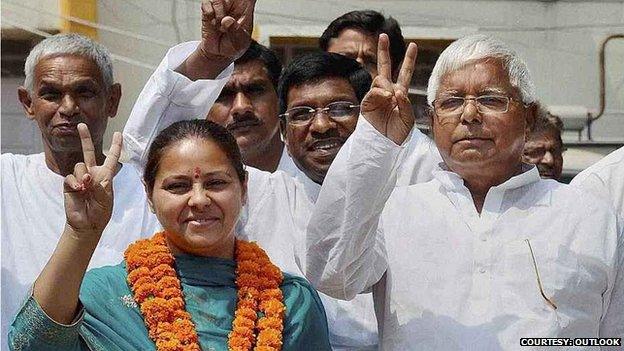Why is Indian politics dominated by dynasties?
- Published
India might be a modern democracy but family and feudal loyalties are intrinsic to it's culture, reports Sanjoy Majumder
For most of its independence, India's politics has been dominated by the Nehru-Gandhi dynasty. Rahul Gandhi, from the fourth generation of that family, now leads the Congress party. The BBC's Sanjoy Majumder looks at why, despite being a flourishing democracy for more than six decades, Indian politics is still very much a family business.
The village of Kundora in the central Indian state of Madhya Pradesh has just come alive.
A black 4x4 vehicle has just driven up, sporting a Congress party flag but with a royal seal on its license plate.
A young man steps out and is immediately engulfed by the villagers who reach out to touch him, some bending forward reverentially.
"Your royal highness," some mutter as they escort him inside.
This is Jyotiraditya Scindia, a minister in India's Congress government but also a member of one of the country's best-known aristocratic families.
The Scindias ruled over this area for more than 300 years. That, and the fact that the local parliamentary seat has voted in favour of Mr Scindia's father and grandmother in the past, makes him a clear favourite.
"My legacy is something I am proud of," he admits.
"But I'm a product of 21st Century India. I believe that it's your work and your track record that matters."
Past matters
Mr Scindia is a rising Congress party star but for many here it's his past, not the future, that matters.
"For us he is and will always remain our king," one old villager says as others nod in approval.
India's not new to political dynasties, the most influential one being the Nehru-Gandhi dynasty of the Congress Party.
"We are essentially a feudal culture," says political commentator Manini Chatterjee.
"It is also not uncommon for children to follow their parents' footsteps in business or even in Bollywood," she adds.

Laloo Yadav, a powerful regional politician and a champion of the lower castes, is fielding his daughter Misa Bharti in these elections
More than a third of the members of the outgoing parliament belong to political families and the trend is clearly spreading.
In the eastern state of Bihar, one of India's poorest, a new political dynasty is on the rise.
Laloo Yadav, a powerful regional politician and a champion of the lower castes, is fielding his daughter Misa Bharti in these elections.
His wife, Rabri Devi, is contesting from another constituency. Party workers say the only reason his son is not running for office is because he is underage.
As Misa Bharti campaigns in the narrow lanes of Bihar's capital, Patna, people come out of their homes for a glimpse of the daughter of one of the state's most popular politicians.
"Of course I have a huge advantage because everyone knows who I am," she says.
"It's all down to my father's goodwill. But I do have to perform," she adds hurriedly.
In a few weeks, India's newly-elected MPs will enter parliament.
But will they be truly representative of the world's largest democracy, or simply resemble a privileged club whose entry is determined by birth?